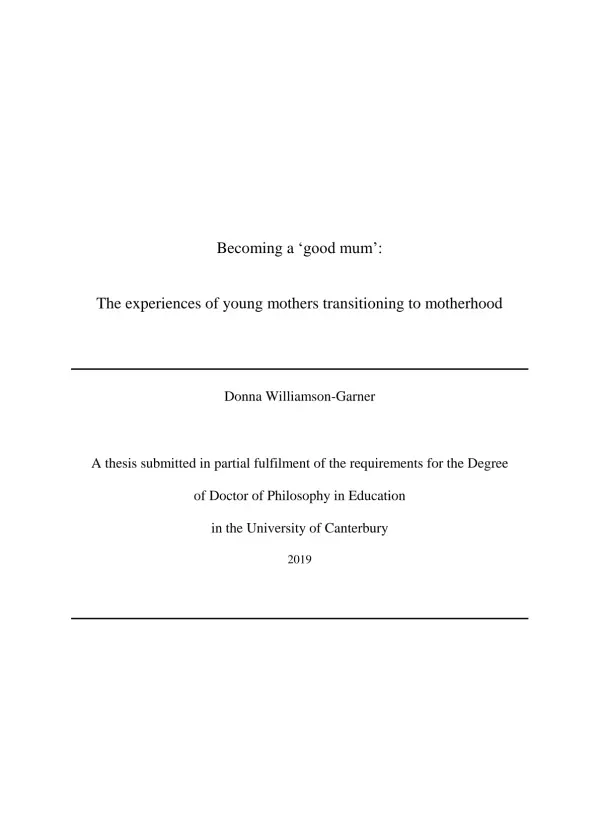
Exploring the Experiences of Young Mothers: A Study on Transitioning to Motherhood
Document information
| Author | Donna Williamson-Garner |
| instructor | Judi Miller, Senior Supervisor |
| School | University of Canterbury |
| Major | Education |
| Document type | thesis |
| Year of publication | 2019 |
| Place | Christchurch |
| Language | English |
| Number of pages | 317 |
| Format | |
| Size | 2.58 MB |
- teen motherhood
- support for young mothers
- identity and transition
Summary
I. Introduction
The introduction sets the stage for understanding the experiences of young mothers transitioning to motherhood. It highlights the significance of teen mothering as a critical social issue. The rationale for the study is grounded in the need to address the stigma surrounding young mothers and the societal perceptions that often accompany teenage pregnancy. The author emphasizes the importance of this research for both personal and professional development, indicating a commitment to exploring the complexities of identity and motherhood. The introduction also outlines the structure of the dissertation, providing a roadmap for the reader. This section is crucial as it establishes the context and urgency of the research, inviting readers to engage with the subsequent findings and discussions.
II. Literature Review
The literature review delves into various societal perspectives on teen pregnancy and the economic implications of teenage motherhood. It discusses the infantalisation discourse, which portrays young mothers as incapable of responsible parenting. The review also addresses the contamination discourse, which suggests that teenage mothers negatively impact societal norms. A significant shift towards a more positive view of teen mothers is noted, emphasizing the need for support systems. The author identifies emotional, material, social, and cognitive support as essential for young mothers. This section is vital as it contextualizes the research within existing literature, highlighting gaps that the study aims to fill. The findings underscore the necessity of reframing societal narratives around young motherhood.
III. Methodology
The methodology section outlines the research design, emphasizing a narrative approach to data collection. The author employs social constructionism to understand the lived experiences of young mothers. The research settings include the Teen Parent Unit and an Early Childhood Education Centre, providing a rich context for participant engagement. The data collection process involved multiple phases, including interviews and thematic analysis. Ethical considerations, such as informed consent and cultural safety, are also discussed. This section is significant as it details the rigorous approach taken to ensure the validity and reliability of the findings. The methodology not only supports the research objectives but also contributes to the broader discourse on ethical research practices in sensitive contexts.
IV. Findings
The findings reveal the multifaceted journey of becoming a young mother. Key themes include the challenges faced during pregnancy, societal pressures, and the need for support. Young mothers express feelings of isolation and the struggle to balance education and parenting. The research highlights the importance of the Teen Parent Unit in providing educational opportunities and fostering meaningful relationships. The findings also explore the process of change that young mothers undergo, emphasizing their resilience and agency. This section is crucial as it presents the voices of the participants, offering insights into their lived experiences. The findings contribute to a deeper understanding of the complexities of young motherhood and the support systems that can facilitate positive outcomes.
V. Discussion
The discussion synthesizes the findings with existing literature, addressing the stigma associated with being a young mother. It explores the implications of the research for policy and practice, advocating for enhanced support systems for young mothers. The author emphasizes the need for a shift in societal perceptions, promoting a narrative that recognizes the strengths and capabilities of young mothers. The discussion also highlights the importance of self-efficacy and resilience in navigating the challenges of motherhood. This section is significant as it not only reflects on the research findings but also proposes actionable recommendations for stakeholders. The insights gained from this study can inform future research and policy initiatives aimed at supporting young mothers.
Document reference
- Ngā pēpeha a ngā tīpuna (Mead, H. & Grove, N.)
